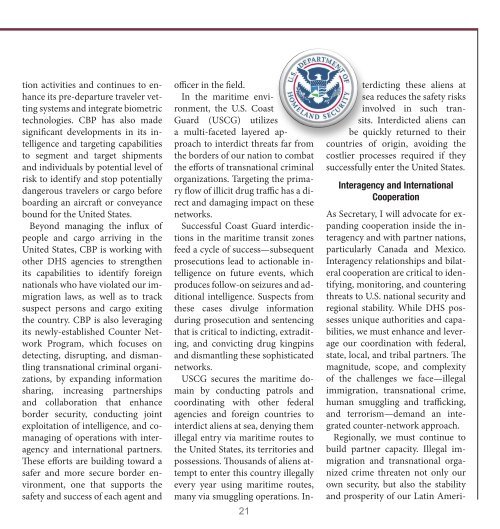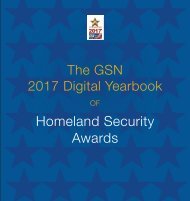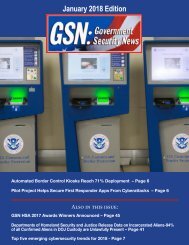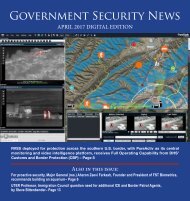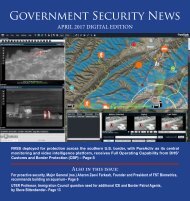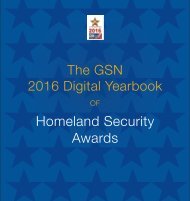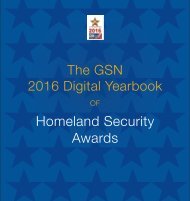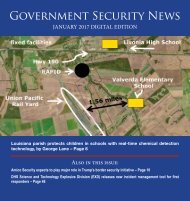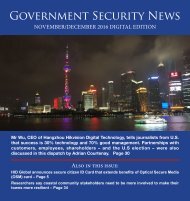Government Security News February 2017 Digital Edition
Create successful ePaper yourself
Turn your PDF publications into a flip-book with our unique Google optimized e-Paper software.
tion activities and continues to enhance<br />
its pre-departure traveler vetting<br />
systems and integrate biometric<br />
technologies. CBP has also made<br />
significant developments in its intelligence<br />
and targeting capabilities<br />
to segment and target shipments<br />
and individuals by potential level of<br />
risk to identify and stop potentially<br />
dangerous travelers or cargo before<br />
boarding an aircraft or conveyance<br />
bound for the United States.<br />
Beyond managing the influx of<br />
people and cargo arriving in the<br />
United States, CBP is working with<br />
other DHS agencies to strengthen<br />
its capabilities to identify foreign<br />
nationals who have violated our immigration<br />
laws, as well as to track<br />
suspect persons and cargo exiting<br />
the country. CBP is also leveraging<br />
its newly-established Counter Network<br />
Program, which focuses on<br />
detecting, disrupting, and dismantling<br />
transnational criminal organizations,<br />
by expanding information<br />
sharing, increasing partnerships<br />
and collaboration that enhance<br />
border security, conducting joint<br />
exploitation of intelligence, and comanaging<br />
of operations with interagency<br />
and international partners.<br />
These efforts are building toward a<br />
safer and more secure border environment,<br />
one that supports the<br />
safety and success of each agent and<br />
21<br />
officer in the field.<br />
In the maritime environment,<br />
the U.S. Coast<br />
Guard (USCG) utilizes<br />
a multi-faceted layered approach<br />
to interdict threats far from<br />
the borders of our nation to combat<br />
the efforts of transnational criminal<br />
organizations. Targeting the primary<br />
flow of illicit drug traffic has a direct<br />
and damaging impact on these<br />
networks.<br />
Successful Coast Guard interdictions<br />
in the maritime transit zones<br />
feed a cycle of success—subsequent<br />
prosecutions lead to actionable intelligence<br />
on future events, which<br />
produces follow-on seizures and additional<br />
intelligence. Suspects from<br />
these cases divulge information<br />
during prosecution and sentencing<br />
that is critical to indicting, extraditing,<br />
and convicting drug kingpins<br />
and dismantling these sophisticated<br />
networks.<br />
USCG secures the maritime domain<br />
by conducting patrols and<br />
coordinating with other federal<br />
agencies and foreign countries to<br />
interdict aliens at sea, denying them<br />
illegal entry via maritime routes to<br />
the United States, its territories and<br />
possessions. Thousands of aliens attempt<br />
to enter this country illegally<br />
every year using maritime routes,<br />
many via smuggling operations. Interdicting<br />
these aliens at<br />
sea reduces the safety risks<br />
involved in such transits.<br />
Interdicted aliens can<br />
be quickly returned to their<br />
countries of origin, avoiding the<br />
costlier processes required if they<br />
successfully enter the United States.<br />
Interagency and International<br />
Cooperation<br />
As Secretary, I will advocate for expanding<br />
cooperation inside the interagency<br />
and with partner nations,<br />
particularly Canada and Mexico.<br />
Interagency relationships and bilateral<br />
cooperation are critical to identifying,<br />
monitoring, and countering<br />
threats to U.S. national security and<br />
regional stability. While DHS possesses<br />
unique authorities and capabilities,<br />
we must enhance and leverage<br />
our coordination with federal,<br />
state, local, and tribal partners. The<br />
magnitude, scope, and complexity<br />
of the challenges we face—illegal<br />
immigration, transnational crime,<br />
human smuggling and trafficking,<br />
and terrorism—demand an integrated<br />
counter-network approach.<br />
Regionally, we must continue to<br />
build partner capacity. Illegal immigration<br />
and transnational organized<br />
crime threaten not only our<br />
own security, but also the stability<br />
and prosperity of our Latin Ameri-


